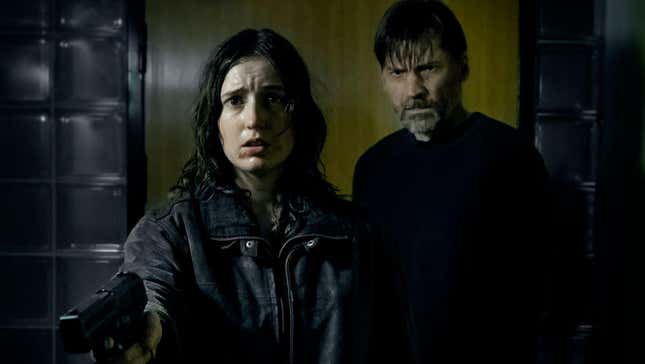
Sequels may be commonplace throughout this summer’s release slate (an evergreen statement), but Nightwatch: Demons Are Forever is probably the least expected. It’s been 30 years since Ole Bornedal’s mortuary thriller kickstarted Nikolaj Coster-Waldau’s career, which the Danish continuation acknowledges. Bornedal analyzes trauma as a hereditary infection, much like David Gordon Green’s Halloween trilogy (for example). It’s hardly revolutionary—grief-laden storytelling permeates the horror genre—but Bornedal does well to differentiate his second entry from the original. Nightwatch is a more terrifying beast; Nightwatch: Demons Are Forever is psychologically stimulating, pitting younger generations against familiar foes.
Coster-Waldau reprises his role as Martin, now a pill-popping father who cannot shake Kalinka’s suicide nor his decades-old brush with death. Martin’s daughter Emma (Fanny Leander Bornedal) regrets how her father’s condition keeps damaging their relationship, so the 20-something medical student goes rogue with the best intentions. Emma confronts an incarcerated Wörmer (Ulf Pilgaard), the man responsible for her father’s shell-shocked malaise. She intends to record a video that will provide Martin closure, but instead awakens a madman who sets a series of unsettling events in motion.
Bornedal doesn’t treat Nightwatch: Demons Are Forever as a typical sequel. Emma isn’t Martin 2.0 despite following in her dad’s night-watching footsteps. Bornedal’s screenplay resurrects legacy characters as a commentary on their respective methods of handling the first film’s tragic events. Jens (Kim Bodnia) flees to Thailand, and Martin is a narcotically numb trainwreck who can’t even prepare dinner without missing 17 steps. Wörmer’s blind, catatonic, and locked away in a pitch-black room until Emma intervenes, addressing prevailing themes of hiding atrocities in plain sight as a coping mechanism. It might be Emma’s fault that Wörmer’s reactivated, but her actions are a response to Martin’s inability to healthily process a host of depressive thoughts that stack a mile high.
Crime procedural fundamentals are present throughout, sharing the diverse perspectives of protagonists and antagonists. Bornedal’s story unleashes another murder spree, but his reveals aren’t what they seem. Nightwatch: Demons Are Forever has plenty in common with the masterful Belgian heartbreaker The Treatment, another investigative horror-thriller that isn’t afraid to embrace its seedy undertones. Emma and Martin’s arcs may be comfortable and storybook, but the film’s guilty parties hide dimensions under their masks. Bornedal keeps his surprises out of sight and boredom out of mind, delivering shocking payoffs that supplement the dominant plotline about Martin’s everlasting demons.
Its more straightforward horror elements aren’t as repetitious, but still exist in this sequel. A sharpened blade slits throats that gush blood like an Italian giallo, not shying away from the savage consequences of Emma’s actions. There’s readable desperation in the eyes of hostages chained to fixtures and unpredictability baked into the insidious performances. Bornedal might emphasize Martin and Emma’s shaky relationship, that still sings with compassion toward one another, or the therapist’s-chair approach to apparent mental wounds, but Demons Are Forever isn’t exhaustively conversational. It’s still a mean and nasty stalker flick, and it’s not always clear who’s truthfully on Emma’s side.
That said, as a sequel, Nightwatch: Demons Are Forever dumps mountains of exposition to treat this 30-years-later continuation as a standalone. Bornedal doesn’t leave anything out, but these fill-in scenes can feel cumbersome—especially if the original is fresh in your mind. There’s too much backstory, which weakens the strides of forward momentum. Not to mention, aspects of Emma and Martin’s journey can feel generically trope-y when Bornedal leans on the returning continuity. And yet, the filmmaker finds a way into his Nightwatch sequel that’s more than a cash-in—one that, while slickly conceptualized, relies on cardinal storytelling devices to hit on blunter examinations of a trauma-inflicted purgatory.
Nightwatch: Demons Are Forever is a suitable sequel with progressive thinking, solid performances, and unsettling vibes. Bornedal establishes sound reasons to revisit the surviving Nightwatch characters and successfully injects new blood into the fray. It might not be nightmarishly horrific, and perhaps too emotionally analytical through dialogue, but there’s still enough melancholic dread to please fans of the original. Whether you enjoyed Nightwatch or queued up Bornedal’s latest on Shudder without realizing it’s a second installment, you’re in equally good hands with Nightwatch: Demons Are Forever.